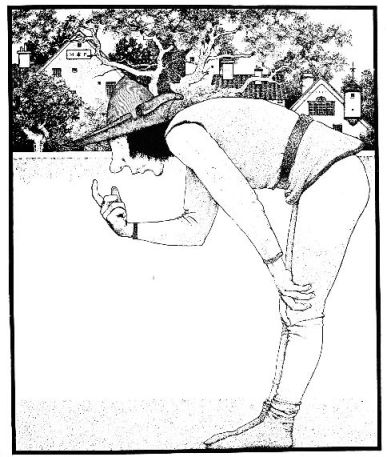Author of The Wonderful Wizard of Oz, The Boy Fortune Hunters in the Yucatan, Daughters of Destiny, etc.
Originally published in the Chicago Record-Herald, August 23, 1904.
[The following story is the first in a series of short faux newspaper articles, all uncredited, leading up to and publicizing the debut of L. Frank Baum and Walt McDougall's weekly newspaper comic page Queer Visitors from the Marvelous Land of Oz (1904-05). The first seventeen episodes of Queer Visitors end with the catch-phrase, "What did the Wogglebug say?" The articles in this series end similarly. This series seems to have been exclusive to the Chicago Record-Herald. A different series of articles, also uncredited—detailing a flight of the Oz characters through outer space—publicized Queer Visitors in newspapers elsewhere. Did L. Frank Baum write these stories? Or did someone at his publisher Reilly & Britton create them? Or did a writer at the Chicago Record-Herald come up with them? Baum did not clip examples for his scrap book, so maybe he isn't the author. The conception of the Land of Oz in these stories diverges from the one Baum later developed in his Oz books, so maybe he isn't the author. They were written before Baum's conception of Oz was fully formed and any differences may mean little, so maybe Baum is the author. Baum's presentation of his Oz characters in Queer Visitors also differed from his later conception, so maybe Baum is the author. Specific details of the Oz characters in these stories match their book counterparts, so maybe Baum is the author. The tone of the stories is as confident and as engaging as Baum's writing could be, so maybe Baum is the author. Maybe we'll never know.]
 |
| Advertisement from the Chicago Record-Herald, August 29, 1904. |
COMING OF AN EX-KING STIRS CHICAGO COLONY
Deposed Ruler of Oz Will Be Remembered as Figuring in That Great Mystery Concerning “What Did the Woggle Bug Say?”
Rumors are current among the Ozite colony in Chicago that the former king of the Land of Oz is planning to visit the United States. It is understood that he will be one of a distinguished party of tourists from Oz who will make headquarters in Chicago.
The coming of the deposed ruler—who, it will be remembered by readers of the Emerald City, (Oz), Hourly Chamelon [sic], reigned as King Scarecrow—will be an event of utmost importance in aristocratic, plutocratic and intellectual circles. Not only does the king date his ancestry from the day the first crow flew over Oz, but in addition he is “full of money”—being stuffed with it—while mentally he was hailed, while ruler, as the wisest person in his domains.
An instance of the remarkable profundity of his intellectual attainments is often cited. Three years ago a Chicago drummer ventured to Oz to introduce Thick Tamales for Attenuated Artists. He was arrested almost instantly by the witty Oz police for telling an old joke. They brought him before the king.
“The punishment, Your Majesty?” faltered the chief of police, as he recounted the offense.
It was proved plainly that there had been no provocation. Horror stood on the face of every courtier at the rightful recital of such a crime in Oz the Original. Silence fell. A pin dropped. It sounded like a crowbar. Perplexity was personified. Could a fitting punishment be found. All eyes sought the serene countenance of the king. He hesitated not.
“You will,” said he, wheeling on the culprit, “recite that joke every fifteen minutes to your jailer until your firm places for sale on State street Attenuated Tamales for Thick Artists. Until then—farewell.”
Cheers shook the throne room from carpet to chandeliers. The court instanly [sic] recognized that it stood before a genius. An immortal fame had been made. But amid the excitement the Woggle Bug suddenly leaned over to His Majesty. He whispered in the regal ear.
King Scarecrow nodded. Quickly he wheeled once more to the pale Chicagoan.
“The sentence is revoked,” he pronounced, simply.
And unto this very day courtiers and policemen keep asking one another,
“What did the Woggle Bug say?”
Originally published in the Philadelphia Public Ledger, June 3, 1917.
Friendship Day in Supposyville
Heigh-ho! Well, what’s the matter now?
What joyous celebration
Is causing all this rumpus and
Delightful dissipation?
Dear me, these good Supposies have
The most entrancing way
Of turning each twelve hours to
A charming holiday.
My! My! Bouquets are here galore,
And messengers are scurrying;
Excitedly from door to door
The postmen all are hurrying.
And from their mail bags you would think
‘Twas really Valentine,
Or Christmas; and the housewives in
A jolly, laughing line
Are handing pies across the fence
And jelly o’er the hedges,
And bits of frosted cakes and pies
In appetizing wedges
To neighbors on the other side;
And every one’s exuberant;
The little boys and girls skip by
With cheeks puffed and protuberant.
(Cake, I guess.)
With mirth and glee, ‘tis Greek to me.
“What’s that? ‘Tis Friendship Day?
Well I declare, it makes one stare.
Comes once a month, you say?”
“Of course it does,” the Queen replies;
“And on this day we’re giving
Gifts to the ones we love and like
While they are well, and living;
We do not wait until our friends
Are lonely, weak and ill;
We send them flowers every month
Here in Supposyville;
We tell them all the jolly, pleasant,
Kindly things we know;
You see,” the Queen smiled up at me,
“We love each other so.”
I rather wish that we could have
A monthly Friendship Day;
Because—well, just because I think
We feel just in that way.
Copyright © 2019 Eric Shanower and David Maxine. All rights reserved.






